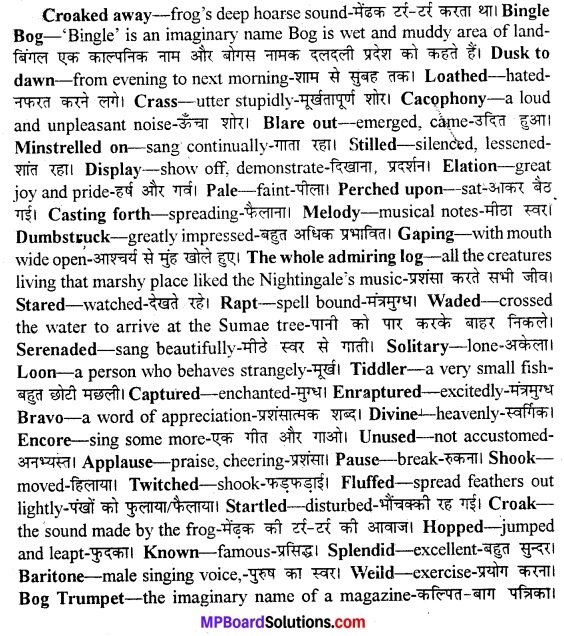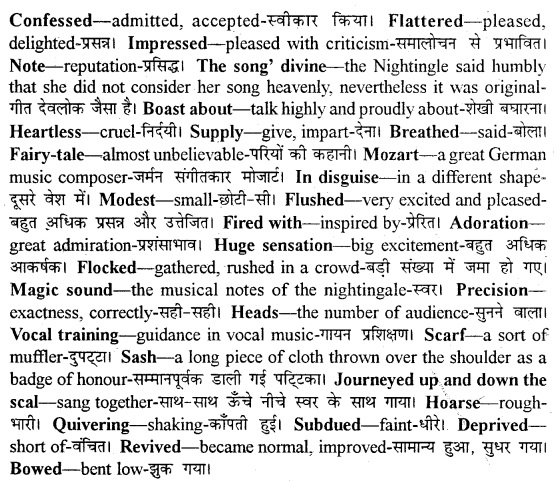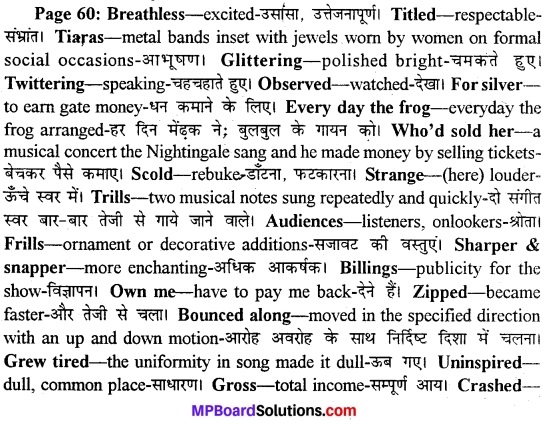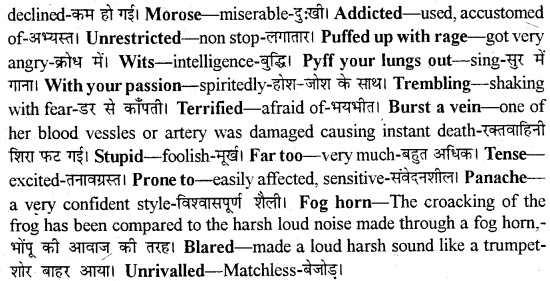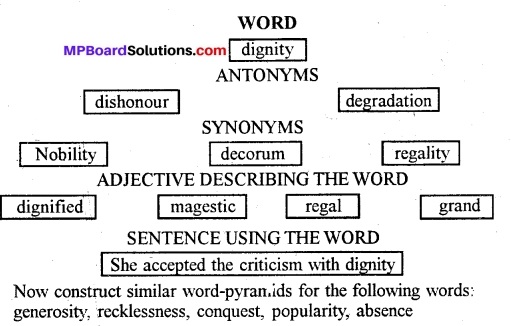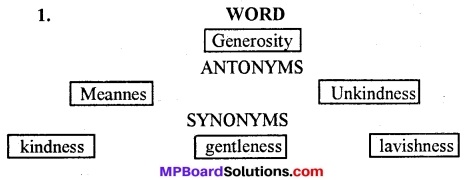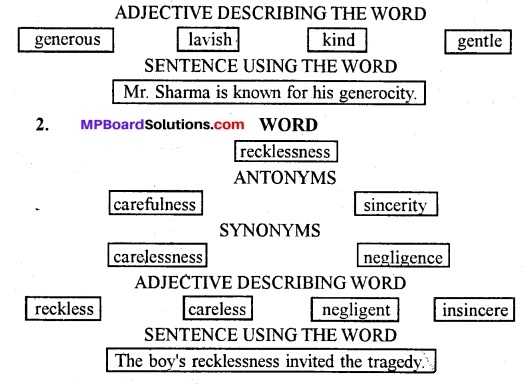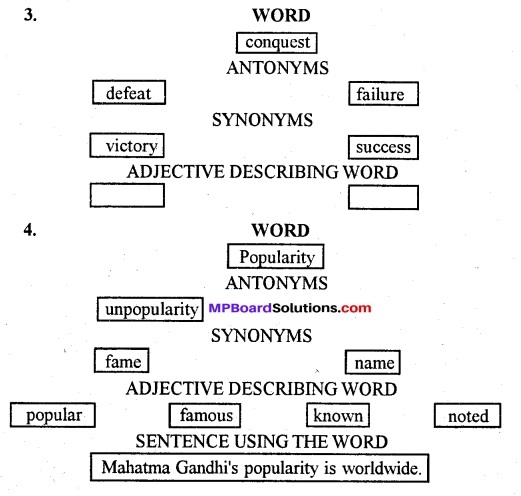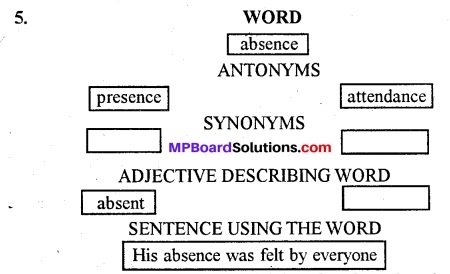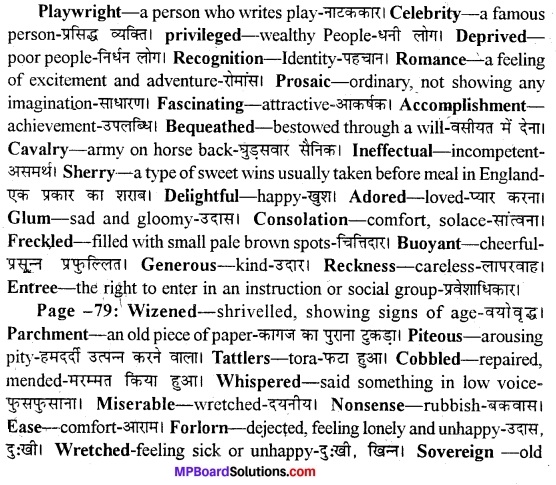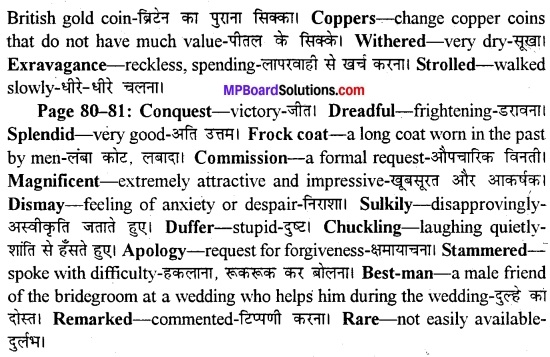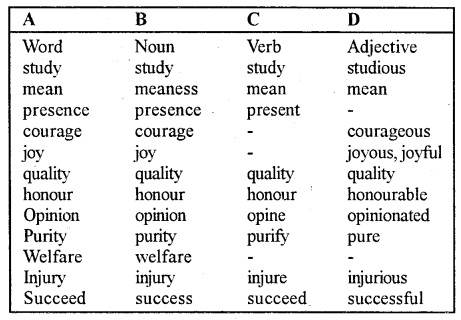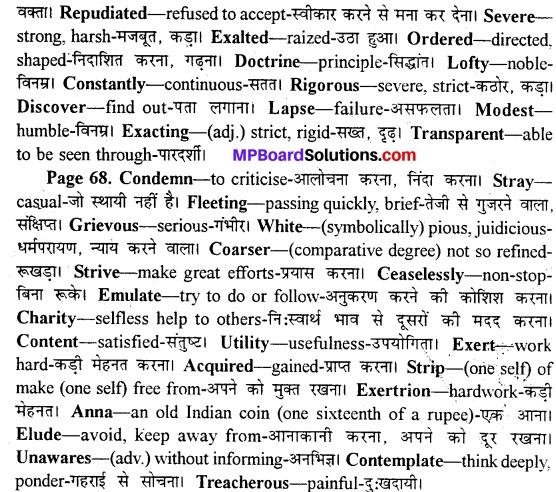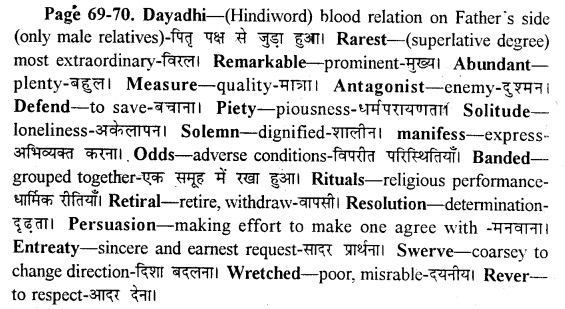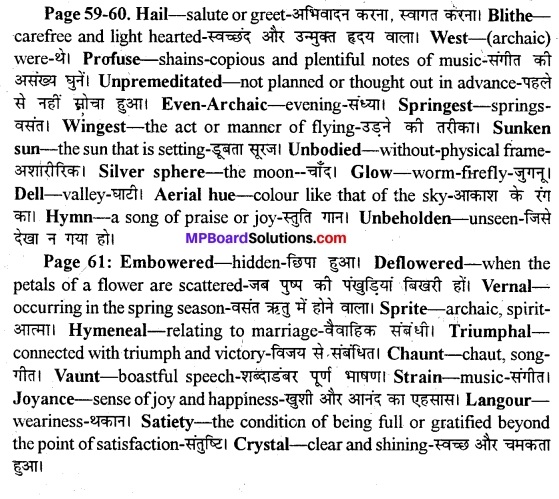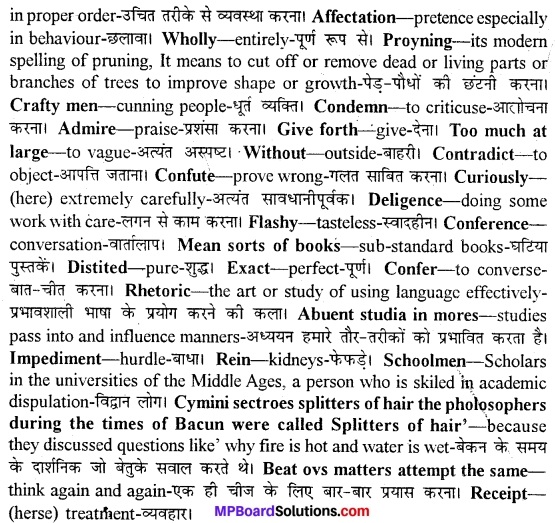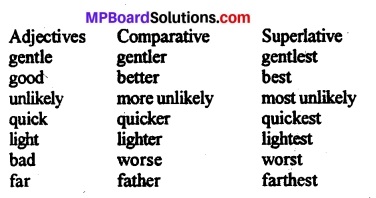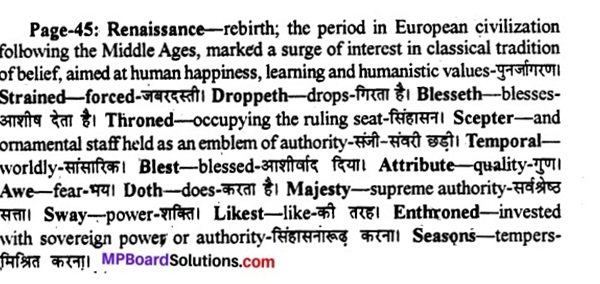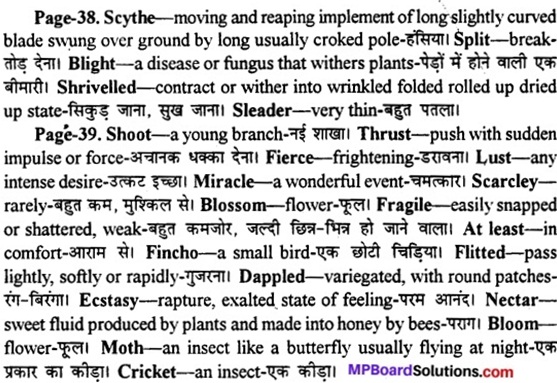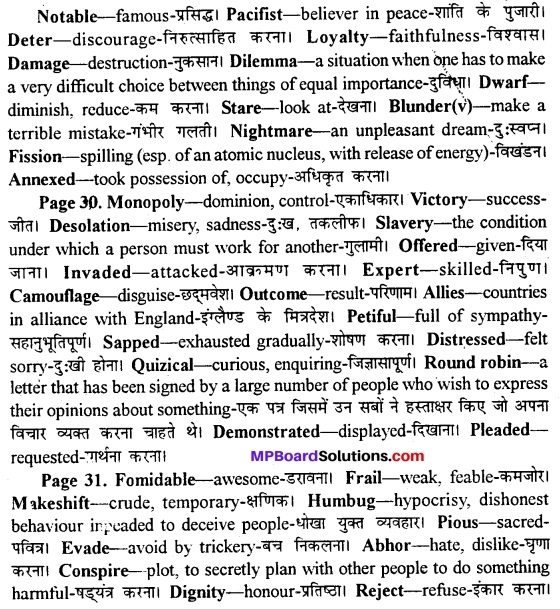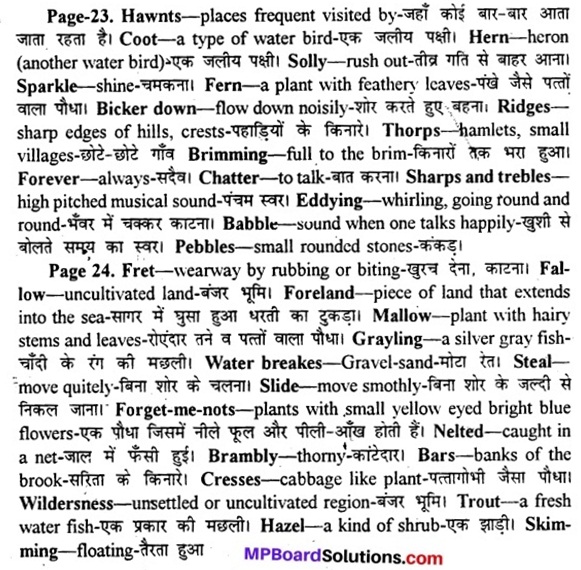Students who are studying 11th can get the free Madhya Pradesh Board Solutions for 11th English Chapter 13 Peace Questions and Answers PDF here. You can download MP Board Class 11th English Solutions Questions and Answers PDF on this page. Practice questions of Mp Board Solutions of 11th English subject as many times as possible to get good marks.
MP Board Class 11th English A Voyage Solutions Chapter 13 Peace (Swami Vivekanand)
Gather chapter wise MP Board Solutions for 11th English Study Material to score the highest marks in the final exam. Various chapters and subtopics are given clearly in MP Board Class 11th English Solutions Chapter 13 Peace Questions and Answers Material. All the MP Board Solutions for 11th English Questions with detailed answers are provided by subject experts. The step by step MP Board Class 11th English Chapter 13 Peace Questions and Answers guide will help you to enhance your skills in English subject and grammar. Here, along with the subject knowledge, grammar knowledge also plays an important role. So, students should download MP Board Solutions 11th English and read it to attempt all the questions with 100% confidence.
Peace Textual Exercise
Word Power
(A) Give antonyms of the following words:
bight, mortal, joy, day, knowledge, peace, might, temporary.
Answer:
- Light – dark
- Mortal – immortal
- Joy – sorrow
- Day – night
- Knowledge – ignorance
- Peace – war
- Might – weakness
- Temporary – permanent
(B) Make verbs of the following using suitable prefixes/suffixes. Dark, power, joy beauty, sweet, light, mortal
Answer:
- Dark – darken
- Power – empower
- Joy – enjoy
- Beauty – beautify
- Sweet – sweeten
- Light – lighten
- Mortal – mortalize.
Comprehension
(A)
Question 1.
‘Behold’, it comes in might ………. In this line, what is implied by ‘it’?
Answer:
‘It’ implies the ‘eternal peace’
Question 2.
What does the poet mean by ‘external death unmourned’?
Answer:
By this expression the poet means the death which hasn’t been mourned for it being for salvation and eternity.
Question 3.
Explain the following lines:
It is sweet rest in music
And pause in sacred art;
Answer:
Here the poet signifies peace in the sense that it is a rest for rejuvenation during music and pause during a sacred art. Such rest gives a new gain of energy.
(B) Answer the following questions in three or four sentences:
Question 1.
What is the ‘Goal of life’?
Answer:
The ‘Goal of life’ is salvation
Question 2.
Where does the spirit return to?
Answer:
The spirit returns to eternity.
Question 3.
What sort of joy and sorrow does the poet refer to?
Answer:
The poet refers to the joy never spoken and sorrow never felt.
Question 4.
What is it that joins might and the next day?
Ans
Teace joins might and the next day.
Question 5.
What element is present in silence admist two fits of passion?
Answer:
Eternal peace is present in silence admist two fits of passion.
Question 6.
Give the central idea of poem?
Answer:
The central idea of poem is to attain real eternal salvation and peace of mind. Spirit is immortal.
(C) Answer the following question in about 150 words.
Question 1.
Why does the poet say that it is ‘death between two lives’?
Answer:
The poet is highly philosophical in this poem. Here he signifies the. ultimate peace of life. As the all prevading force, it maintains the harmony – needed to energeis the human spirit. It is a state of our existence that inspires us to rise above worldly limitations and appreciates real power, joy, beauty and knowledge. The poet believes in the rebirth of the life after death i.e. the life or eternity of spirit. He says that peace is there i.e. death which can be said to be just an internal or pause which one takes to rejuvenate one’s strength and vigour. It is the element which one to begin a new life with more enthusiasm. It is a divine bliss.
Poetic Devices
(A) (See Text book page – 101)
Answer:
Read and observe yourself
(B) (See Text book page – 101)
Answer:
Read and observe yourself.
(C) (See Text book page – 101)
Answer:
Read and observe yourself.
(D) Read the lines and write them in your note book and notice the repeated sounds:
Alliteration is a figure of speech in which the same sound is repeated at the beginning of each word. Alliteration has been employed in the 11th, 15th 21st and 27th lines.
Answer:
Line 11 – It is Not might Nor marrow.
Line 15 – The Silence between Speaking Line 21
And knowledge Never Known Line 27
To Spread the Smiling form
(E) In the first stanza ‘might’ in the line (1) rhymes with might in line (4). Mention .the other rhymed lines in the subsequent stanza.
Answer:
- Sorrow – morrow
- Art – heart
- Alone – known.
Speaking Activity
(See Text book page – 102)
Answer:
Read and observe yourself.
Writing Skills
(A) Expand the idea contained in the following lines:
Question 1.
Between two fits of passion, it is the calm of the heart.
Answer:
This lines signifies the eternal peace. The poet says that it is an unknown and unexplained feeling or something unseen which is between two fits of passion. It is the real calm of the heart. It is the real joy.
Question 2.
It is a song that lives un-sung. knowledge never known.
Answer:
This lines says that the eternal peace is a song which has never been sung and knowledge which has never bean known. It means it is an unexplained feeling or image which no one has ever seen.
(B) Read the following poem by Sarojini Naidu on the same theme and answer the questions that follow:
(See Text book pages 102 – 103)
Questions:
(i) Find out the antonyms of the given words from the text: Hide, sorrow, find, ignorance, ask, death, pollute, high
(ii) What does the soul request the Master to reveal?
(iii) What is the substance that the soul requests the Lord to give it?
(iv) Which gift does the soul beg not to be withheld from it?
(v) How would love burn the soul?
(vi) What shall the soul’s chastened spirit yearn for?
(vii) ‘Life is a prism of my light, and the shadow of My face.’
What does God wish to convey to the soul?
(viii) Give the central idea of the poem.
Answers:
(i)
- Hide – reveal
- Sorrow – joy
- Find – drain
- Ignorance – knowledge
- Ask – answer
- Death – life
- Pollute – cleanse
- High – low
(ii) It requests to reveal the in most laws of life and death.
(iii) Each joy and pain which the God’s eternal hand can meet.
(iv) The intricate care of love and life,
(v) It would drink,deep joy and fame and thus love shall bum the soul.
(vi) To seek from its blind player release.
(vii) God conveys that life is a prison of God’s light which focuses all the colours of life. One can see the direct reflection of God through it.
(viii) The central idea of the poem is to highlight the all – powerful God which has created this world. Soul’s purification and attainment of God’s bliss is the real end
Think It Over
1. Do you think the theme of the poem has a social relevance?
2. Can internal peace lead to a better understanding of the society?
Answer:
1. This poem has a strong social relevance for it invocates peace ,to be the real bliss. Salvation is the goal of life. It has a craving for the purification of soul and perfection of life Today man is pre-occupied with a lot of problem like worries, war. crime demoralization, etc. Hence, this poem is a complete social poem.
2. Yes, peace leads to a better understanding of the society. Peace gives opportunity to medicate over the things and finds the perfect solution to any of it
Think To Do
Collect information about Swami Vivekanand’s life and philosophy.
Answer:
Do yourself
Peace Summary in English
‘Peace’ is a spiritual poem by Swami Vivekananda. It signifies the ultimately need of life. The poet invocates the reader and says that, peace, comes in might. It is the power that is not power and the light that appears in darkness. It is the shade that appears in dazzling light. It is the joy that is always unspoken and the grief that is never felt. It is profound. It is the immortal life which is never lived. Actually it is not joy nor sorrow but something which is between them. It is not might nor morrow but something that joins the both. It is not sweet rest during music and pause of sacred art.
It is the silence between speaking and the calm of heart between two passions. For the poet it is beauty which has never been seen and love that stands alone. It is a song which always remains unsung and the knowledge which is never known. It is death between two lives. It is lull between two storms and the empty space between the virgin and end of the universe. It is something that absorb all the tears and spread smile. It is the smiling form and the goal of life and peace is its ultimate home.
Peace Summary in Hindi
प्रस्तुत कविता एक अध्यात्मिक कविता है जो स्वामी विवेकानंद द्वारा रचित है। यह जीवन की मूलभूत आवश्यकता पर जोर देती है। कवि पाठकों का आह्वान करते हुए कहता है कि शांति ताकत से आती है। यह वह शक्ति है, जो शक्ति नहीं है और वह प्रकाश है जो अंधेरे में दिखाई देता है। यह वह छाया है जो तेज प्रकाश में प्रकट होता है। यह वह आनंद है जो हमेशा अव्यक्त रहा और वह दु:ख है जिसे कभी महसूस नहीं किया गया। यह गहन है।
यह वह अमर जीवन है जो कभी जीया नहीं गया। वास्तव में यह न आनंद है न दु:ख है बल्कि इन दोनों को जोड़ने वाला ‘कुछ’ है यह संगीत के बीच का सुखद आराम है और एक पवित्र कला के बीच का विराम है। यह वार्तालाप और खामोशी के बीच की शांति है। कवि के लिए यह सौंदर्य है जिसे कभी देखा नहीं गया और वह प्यार है जो हमेशा अकेले खड़ा रहा। यह वह संगीत है जो कभी गाया नहीं गया और वह ज्ञान है जिसे कभी जाना नहीं गया। यह दो जीवन के बीच की मृत्यु है। यह दो तूफानों के बीच की शांति है और सृष्टि के उद्गम और अंत के बीच का खाली स्थान है। यह ‘कुछ’ है जो आंसुओं को अपने में समेट लेता है और मुस्कान बिखेरता है। यह मुस्कान का एक रूप है। यह जीवन का चरम लक्ष्य है और शांति इसका अंतिम आवास है।
Peace Word Meaning
Read the following stanzas carefully and answer the questions that follow:
1. Behold, it comes in might.
The power that is not power,
The light that is in darkness,
The shade in dazzling light,
It is joy that never spoke,
And grief unfelt, profound.
Questions:
(i) What is ‘it’ in the above lines?
(ii) How does ‘it’ come?
(iii) What sort of power is it?
(iv) Where does this light appear?
(v) What sort of joy is it?
Answers:
(i) ‘It’ stands for the ultimate need of life.
(ii) ‘It’ comes in might.
(iii) It is the power that is really not a power.
(iv) This light appears in darkness.
(v) It is the joy that is never spoken.
2. It is sweet rest in music;
And pause in sacred art;
The silence between speaking;
Between two fits of passion- It is the calm of heart.
Questions:
(i) What type of rest is ‘it’?
(ii) What does the second line in the above stanza signify?
(iii) Explain the meaning of the third line?
(iv) Give the opposite word from the stanza for‘start’?
Answers:
(i) ‘It’ is the sweet rest.
(ii) The second line signifies that it is the pause in the sacred art that heightens its beauty.
(iii) It means that the silence in the midst of speaking is rejuvenation of strength.
(iv) ‘Pause’.
3. To it the tear-drop goes,
To spread the smiling form
It is the smiling form
It is the Goal of Life,
And Peace-its only home!
Questions:
(i) What happens to tear-drop?
(ii) What does ‘it’ do to tear-drop?
(iii) What is its form?
(iv) What do you mean by ‘goal of life’?
Answers:
(i) ‘It’ absorbs the tear-drops.
(ii) ‘It’ spreads the tear-drops in the smiling form.
(iii) Its form is smiling.
(iv) It means the ultimate aim of one’s life.
Above provided complete MP Board Solutions 11th English Study guide is useful for making your preparation effective. Students can frequently visit our page to get the latest updates on other subjects study materials.
